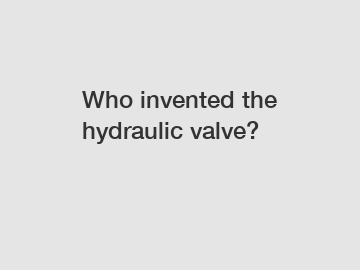Who invented the hydraulic valve?
Huade Hydraulic supply professional and honest service.
In the world of engineering and technology, there are many inventions that have revolutionized various industries. One of these inventions is the hydraulic valve, a crucial component in hydraulic systems that allows for the control and regulation of fluid flow. But have you ever wondered who invented the hydraulic valve?
The invention of the hydraulic valve can be traced back to the 19th century when engineers and inventors were exploring ways to harness the power of water for various applications. However, it was not until the early 20th century that the first hydraulic valve as we know it today was developed.

One of the earliest pioneers in the field of hydraulics was the French engineer Edouard Hallé, who is credited with inventing the first hydraulic valve in 1904. Hallé's design allowed for the precise control of fluid flow in hydraulic systems, leading to significant advancements in industries such as manufacturing, construction, and agriculture.
Hallé's hydraulic valve was a breakthrough in hydraulic technology, as it provided engineers with a reliable and efficient way to regulate the flow of fluid in hydraulic systems. This invention paved the way for further advancements in hydraulic engineering and laid the foundation for the development of modern hydraulic valves.
Over the years, hydraulic valves have evolved significantly, with new designs and technologies being developed to meet the changing needs of various industries. Today, hydraulic valves are used in a wide range of applications, from heavy machinery and construction equipment to medical devices and aerospace systems.
One of the key features of hydraulic valves is their ability to control the flow of fluid in hydraulic systems, enabling engineers to precisely regulate the speed, direction, and pressure of hydraulic equipment. This level of control is essential for ensuring the safe and efficient operation of hydraulic systems in a variety of industries.
Additional reading:Mastering Flow Control with 2 Inch Check Valve
7 Must-Know Hydraulic Valve Applications for Efficiency
Ultimate Guide to Direct Acting Pressure Reducing Valve: Everything You Need to Know!
Mastering the Functionality of 3-Way Proportional Valves
How to Troubleshoot Decompression Control Valve Issues
How does a decompression control valve work?
Proportional Control & Servo Valves: Ultimate Guide!
In addition to Edouard Hallé, there have been many other engineers and inventors who have contributed to the development of hydraulic valves over the years. One of the most notable figures in this field is the American engineer Harry F. Vickers, who is credited with inventing the first practical hydraulic valve in the 1930s.
Vickers' hydraulic valve revolutionized the industry by introducing new technologies such as spool valves and pilot-operated valves, which allowed for even greater control and precision in hydraulic systems. His innovations paved the way for the widespread adoption of hydraulic valves in industries around the world.
Today, hydraulic valves are an essential component in hydraulic systems, playing a critical role in ensuring the safe and efficient operation of a wide range of equipment. From construction machinery and agricultural equipment to aircraft and medical devices, hydraulic valves are used in countless applications that rely on the power of hydraulics.
In conclusion, the invention of the hydraulic valve has had a significant impact on the field of engineering and technology, revolutionizing the way hydraulic systems are designed and operated. While the exact origins of the hydraulic valve may be difficult to pinpoint, it is clear that the contributions of engineers like Edouard Hallé and Harry F. Vickers have played a crucial role in the development of this essential component.
As technology continues to advance, we can expect to see further innovations in hydraulic valves that will continue to push the boundaries of what is possible in hydraulic engineering. The future of hydraulic valves looks bright, with new designs and technologies being developed to meet the evolving needs of industries around the world.
For more Common uses of proportional control valvesinformation, please contact us. We will provide professional answers.
Additional reading:How to Choose Hydraulic Valve Online: A Comprehensive Guide
Can Threaded Water Well Drill Pipe be Recycled?
A Comprehensive Guide to Down-The-Hole Drilling Tools
Maximize Efficiency with Sequential Control Valves
Mastering Proportional and Servo Valves: A Guide
How to Choose Common Uses of Proportional Control Valves
10 Questions You Should Know about Hydraulic Pressure Control Check Valves

Comments
0